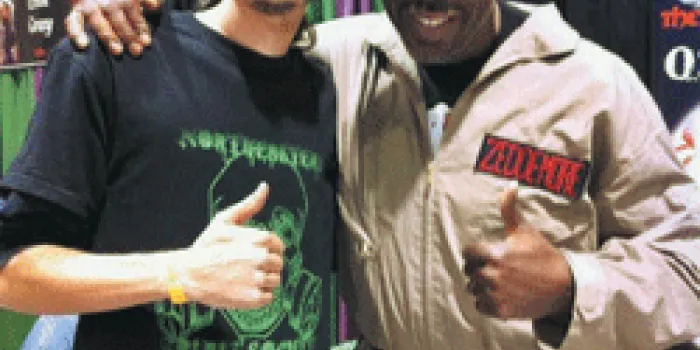In each issue of HemAware, we “Take 5” with people in the bleeding disorders community and spotlight their efforts with just five questions. Here, we talk with Sam Trivette, 29, a paranormal investigator from Frankfurt, Kentucky. He has severe hemophilia A but says his hobby does not compromise his health.
What is paranormal investigation?
Paranormal investigation is the search for anything that is believed to exist with no scientific explanation—like ghosts or spirits, extraterrestrials or cryptids, such as Sasquatch, the Loch Ness monster and other mythic creatures.
What got you interested in paranormal investigation?
Ever since I was a little kid and saw Ghostbusters, I’ve been interested in ghosts. Once when I was a little kid, sleeping at my grandmother’s house, I thought I saw a couple of ghosts in my room. I started yelling and screaming, and my grandmother came in and chased them away with a frying pan.
What equipment do you use?
I use a couple of digital video recorders, a Mel Meter, a spirit box and a couple of laser grids. The Mel Meter registers EMF (electromagnetic fields) and temperature. The spirit box is an AM/FM radio that will scan through the radio frequency at specific speeds. Sometimes it picks up what sounds like words. Some people believe that it’s one way that spirits communicate. Laser grids can be used with a video recorder to help show movement.
Talk about recent and future investigation sites.
I went to Waverly Hills Sanatorium in Louisville, Kentucky. It’s an old hospital that was built to treat patients with tuberculosis in the early 1900s. It’s supposedly one of the most haunted places in the area. When I first went, though, I didn’t think I heard or saw much of anything, but when I went back and reviewed the recordings, I think I may have an EVP (electronic voice projection) of a female scream.
Buffalo Trace Distillery in Frankfurt supposedly has a lot of paranormal activity that I would like to check out. There are Civil War battlefields all over Kentucky that are good places to investigate. Most of the places I go to are well-known places that have been investigated by a lot of people. But I would really like to offer my services to individuals, to investigate residences. I wouldn’t charge anything. It’s all about the experience.
What’s your ultimate goal with paranormal investigation?
There’s a big community of people interested in the paranormal on Facebook and Twitter. I want to learn as much as I can and share it with that community because there’s still no scientific explanation for anything of this yet. The more people who are interested in paranormal activity, the more people you get investigating, then the more information you’ll have.
I believe in being open-minded while investigating. I’m willing to believe, but I’m skeptical, too. If I can re-create what people think is a paranormal experience, then it’s not paranormal. But if I can’t, then maybe it’s something unknown. And besides just bumbling around in the dark with a bunch of technical equipment, the more important part of being a paranormal investigator is research. It’s important to look into the history of where I’m investigating and find the stories of what may have happened in the past. They can help explain the stories of what is happening now.
Do you know an interesting individual we should profile in a future issue of HemAware? E-mail Managing Editor January W. Payne.

